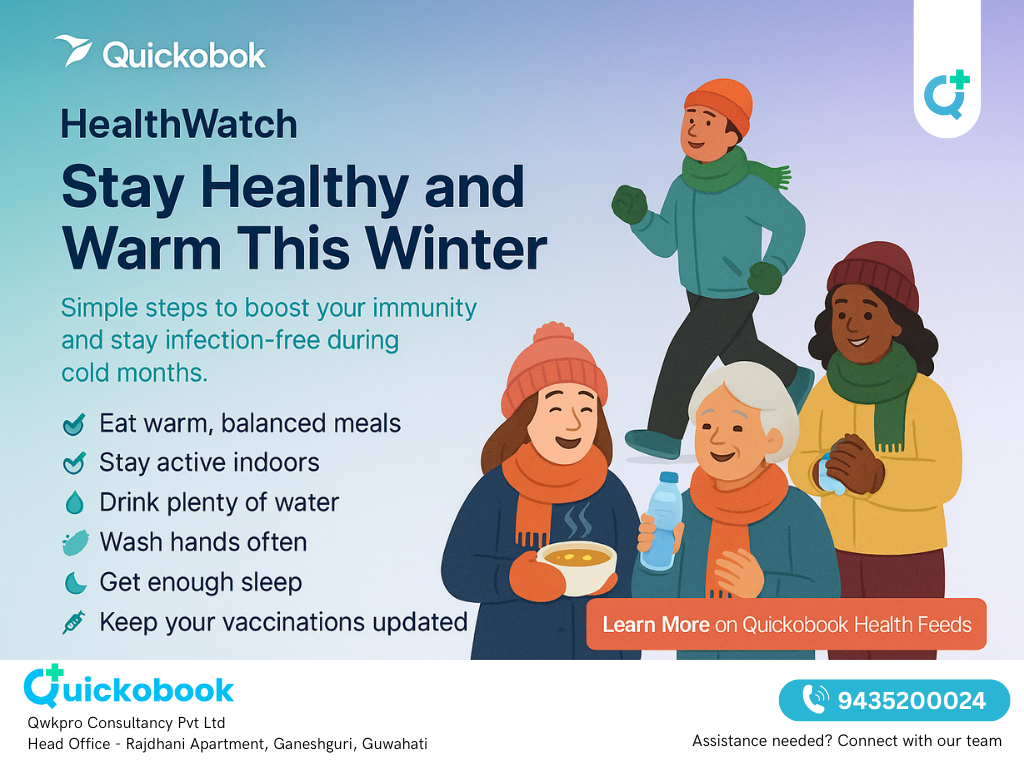Introduction
As winter arrives across India, so do the chilly winds, cozy sweaters, and the increased risk of coughs, colds, and dry skin. While the season brings festive cheer and comfort foods, it also challenges your immune system and overall health.
This edition of HealthWatch focuses on how you can prepare your body, mind, and skin for winter with expert-backed tips and timely doctor consultations. With guidance from the Quickobook health blog, you’ll learn practical ways to boost immunity, stay active, and protect your skin—all tailored for Indian weather conditions.

Understanding Winter Health Challenges
During winter, the body’s immune response tends to weaken. Cold air dries the skin and nasal passages, making you more prone to infections like cold, flu, bronchitis, and pneumonia.
In North India, smog and pollution worsen respiratory health, while in the South, mild winters bring humidity that can trigger allergies. The combination of low temperatures, reduced sunlight, and lifestyle changes makes preventive care more important than ever.

Why Doctor Consultation Matters in Winter
Many people ignore minor winter symptoms until they become serious. A timely doctor consultation helps you:
- Diagnose and treat cold, cough, or throat infections early.
- Get the right advice for managing asthma, sinusitis, or seasonal allergies.
- Discuss immunity-boosting supplements like Vitamin C, D, and Zinc.
- Plan vaccinations such as flu shots to prevent complications.
Quickobook Tip: You can easily book a doctor consultation online through Quickobook.com for faster, safer, and hassle-free healthcare—especially during cold months when hospital visits may be inconvenient.

Building Immunity for the Cold Season
Your immune system needs extra support during winter. Here’s how you can strengthen it naturally:
- Eat vitamin-rich foods: Citrus fruits, guava, amla, spinach, and carrots.
- Add herbs and spices: Tulsi, turmeric, black pepper, and ginger keep the body warm and infection-free.
- Stay hydrated: Cold weather can mask thirst; aim for 8 glasses of water daily.
- Sleep well: 7–8 hours of rest boosts natural immunity.
- Consult your doctor before starting supplements or herbal remedies.
A balanced immune system protects not just against infections but also reduces long-term inflammation and fatigue.

Skin Care in Winter — Protect, Moisturize, Glow
Winter can strip your skin of its natural oils, leading to dryness, itchiness, and cracks. A dermatologist’s key advice includes:
- Use a thick moisturizer twice a day, especially after bathing.
- Avoid long, hot showers that dehydrate your skin.
- Apply sunscreen even on cloudy days to prevent UV damage.
- Use mild, fragrance-free cleansers and drink enough water.
- Add vitamin E and omega-3-rich foods like almonds, walnuts, and fish.
Quickobook Health Blog Insight: For severe dryness or eczema, book a dermatologist consultation on Quickobook to get a personalized winter skincare routine.
READ ALSO: Higher Levels Of Greenness Associated With Fewer Hospital Admissions For Mental Illness
Nutrition: Eat Warm, Eat Smart
Your winter plate should be colourful, hearty, and nutrient-packed:
- Soups and broths: Boost hydration and warmth.
- Seasonal veggies: Carrots, beets, methi, sarson, and spinach for vitamins and antioxidants.
- Protein power: Include dals, eggs, paneer, or fish for tissue repair.
- Good fats: Ghee, nuts, and seeds maintain energy and skin health.
- Limit sugar and fried foods that can weaken immunity.
A consultation with a nutritionist on Quickobook can help design a personalized winter diet plan.
Stay Active Even When It’s Cold
Skipping workouts in winter can reduce metabolism and immunity. Stay motivated with:
- Morning stretching indoors if it’s too cold outside.
- Yoga and pranayama to keep lungs strong.
- Brisk walking during sunlight hours for vitamin D.
- Layered clothing and proper footwear for warmth and safety.
Remember: Motion boosts circulation and immunity.
Don’t Ignore Sunlight and Vitamin D
With shorter days and cooler weather, sunlight exposure drops, leading to vitamin D deficiency—common in India during winter.
- Spend at least 20 minutes in the morning sun.
- Include fortified milk, mushrooms, and egg yolks in your diet.
- Get your vitamin D levels tested via Quickobook’s lab partners.
Doctor consultation can help determine if you need supplements to maintain bone and immune health.
Respiratory Health and Pollution Protection
Winter increases pollution levels in many Indian cities. To protect your lungs:
- Wear a mask while outdoors.
- Use an air purifier at home if you live in a polluted area.
- Practice steam inhalation to clear nasal passages.
- Stay indoors during smog alerts.
If you experience persistent cough, wheezing, or breathlessness, book a pulmonologist consultation on Quickobook immediately.
When to See a Doctor
You should schedule a doctor consultation if you notice:
- Fever lasting more than 3 days
- Chest congestion or breathing difficulty
- Continuous dry or wet cough
- Unusual skin rashes or infections
- Body aches or fatigue that don’t go away
Early diagnosis prevents complications and ensures a healthy winter season.
Quickobook Health Blog Expert Summary
- Preventive care is better than cure.
- Doctor consultations, healthy eating, and winter skincare keep you strong.
- Personalized guidance ensures safety for kids, elders, and chronic patients.
Visit Quickobook.com to find doctors, book online consultations, and access health blogs that make seasonal wellness simple.
50 Frequently Asked Questions (FAQs)
Q1. Why do people fall sick more often in winter?
Cold air weakens immunity and allows viruses like the flu and common cold to spread more easily. Indoor crowding also increases transmission.
Q2. What are the most common winter illnesses?
Colds, flu, sinus infections, bronchitis, asthma flare-ups, and skin dryness are most common during Indian winters.
Q3. When should I consult a doctor for a cold or cough?
If symptoms last more than 3–5 days, include high fever, or cause breathing difficulty, book a doctor consultation immediately.
Q4. How can I strengthen my immune system in winter?
Eat vitamin-rich foods, stay hydrated, sleep well, and consult a doctor for immunity-boosting supplements like Vitamin D and Zinc.
Q5. What is the role of Vitamin D in winter health?
Vitamin D supports bone strength and immune defense. Since sunlight is limited in winter, you may need fortified foods or supplements.
Q6. Can dehydration happen in winter?
Yes. Cold weather reduces thirst, so make sure to drink enough water throughout the day.
Q7. What are the best foods to eat in winter?
Soups, seasonal vegetables like spinach and carrots, nuts, ghee, and whole grains help keep your body warm and nourished.
Q8. How can I prevent the flu naturally?
Wash hands often, stay warm, eat citrus fruits, and get a flu shot if recommended by your doctor.
Q9. Can poor air quality worsen winter health?
Yes, pollution can trigger allergies, asthma, and lung infections. Wear a mask and avoid outdoor activities during smog alerts.
Q10. How can I improve air quality at home?
Use indoor plants, air purifiers, and keep windows slightly open for ventilation when pollution levels are low.
Q11. Is it okay to exercise outdoors in winter?
Yes, but wear layered clothing and exercise during daylight hours to avoid cold-induced breathing issues.
Q12. What is the best time to get sunlight in winter?
Between 8 AM and 10 AM for about 20 minutes daily is ideal for Vitamin D synthesis.
Q13. How do I protect my skin in winter?
Moisturize twice daily, avoid long hot baths, and use mild cleansers. Drink enough water and eat healthy fats for natural hydration.
Q14. Can winter cause acne or skin irritation?
Yes. Dry air can cause flaking, while heavy creams can clog pores. Choose non-comedogenic moisturizers suited for your skin type.
Q15. What’s the best moisturizer for Indian winter?
Thick creams with shea butter, glycerin, or hyaluronic acid work best for dry skin in winter.
Q16. Can using too much heater harm my skin?
Yes. Continuous indoor heating dries out the air, leading to itchy and flaky skin. Use a humidifier if needed.
Q17. How can I avoid cracked lips in winter?
Apply lip balm with shea butter or coconut oil regularly and avoid licking your lips.
Q18. Should I use sunscreen in winter?
Absolutely. UV rays can still cause skin damage even on cloudy days. Use SPF 30 or higher.
Q19. What foods improve winter skin health?
Include foods rich in Vitamin E, omega-3 fatty acids, and antioxidants such as almonds, walnuts, and spinach.
Q20. Can I use oil instead of cream for winter dryness?
Yes, natural oils like coconut, almond, or olive oil can lock in moisture effectively.
Q21. Why is my skin itchy during winter?
It’s caused by loss of moisture in cold, dry air. Use thicker moisturizers and avoid harsh soaps.
Q22. How can I take care of my hair in winter?
Oil your scalp twice a week, use mild shampoo, and avoid washing with very hot water.
Q23. What’s the best winter morning routine?
Drink warm water, do light exercise, take sunlight, and eat a healthy breakfast rich in protein and vitamins.
Q24. Can cold weather cause joint pain?
Yes. Low temperatures may stiffen joints, especially in arthritis patients. Stay active and keep joints warm.
Q25. Are herbal drinks helpful for winter immunity?
Yes. Ginger-tulsi tea, turmeric milk, and kadha can support immunity when used moderately.
Q26. Can winter affect mental health?
Yes. Reduced sunlight can cause fatigue and low mood. Maintain a routine, stay active, and get enough daylight.
Q27. Is it okay to take supplements in winter?
Yes, but only after doctor consultation to avoid overdose or drug interactions.
Q28. Should I avoid going out in foggy weather?
Yes, as fog may contain pollutants that irritate lungs and eyes.
Q29. What home remedies help with sore throat?
Saltwater gargles, honey-ginger tea, and warm fluids provide quick relief.
Q30. How can I prevent sinus infections in winter?
Stay hydrated, use nasal saline rinses, and avoid sudden temperature changes.
Q31. Does cold weather affect asthma?
Yes. Cold air can trigger asthma attacks. Always carry your inhaler and consult your doctor if symptoms worsen.
Q32. Can children get sick more easily in winter?
Yes, because their immunity is still developing. Keep them warm, hydrated, and vaccinated.
Q33. What are signs I should see a doctor immediately?
High fever, persistent cough, chest pain, or shortness of breath need medical attention.
Q34. Can home heating cause breathing issues?
Poor ventilation or gas heaters can reduce air quality. Use them carefully and keep air circulation open.
Q35. What is the best winter bedtime routine?
Moisturize your skin, drink herbal tea, and ensure a warm but ventilated sleeping environment.
Q36. Is dry throat in winter normal?
Yes, it’s common due to low humidity. Steam inhalation or humidifiers can help.
Q37. Can skipping meals affect immunity?
Yes, it weakens energy and immune defense. Eat small, regular, nutrient-dense meals.
Q38. What’s the safest way to boost energy in winter?
Exercise daily, eat iron-rich foods, and maintain a consistent sleep cycle.
Q39. How can I prevent cold hands and feet?
Wear warm socks, keep moving, and avoid prolonged exposure to cold surfaces.
Q40. Does stress lower immunity?
Yes, chronic stress can suppress immune responses and delay recovery from illness.
Q41. Can I get flu and COVID-19 together?
Yes, it’s possible. Vaccination and early consultation help reduce risks.
Q42. How to tell if it’s flu or common cold?
Flu has high fever, body ache, and fatigue; cold is usually milder. Doctor consultation helps confirm.
Q43. Is it safe to travel during winter flu season?
Yes, if you take precautions—masking, sanitizing, and staying hydrated.
Q44. Should I take a flu shot every year?
Yes, annual flu vaccines are recommended for best protection.
Q45. How can I protect elderly family members in winter?
Ensure warm clothing, proper nutrition, regular check-ups, and indoor safety.
Q46. Is turmeric milk really beneficial?
Yes, it has anti-inflammatory and immune-supportive properties.
Q47. Can pets make you sick in winter?
Not usually, but maintain hygiene and keep them warm and clean.
Q48. How to maintain hydration in cold weather?
Drink warm water, soups, and herbal teas throughout the day.
Q49. Can winter trigger allergies?
Yes, dust mites and mold spores often increase during winter. Clean your home regularly.
Q50. Where can I consult a doctor online for winter health issues?
Visit Quickobook.com to connect with trusted doctors across India for online consultations and personalized winter care.
Conclusion
Winter can be a joyful and healthy season if you prepare wisely. Focus on doctor consultation, balanced nutrition, hydration, and proper skin care in winter. Prevention is easier than cure—and your doctor is just a click away on Quickobook.
Quickobook CTA
Stay winter-ready with expert doctors.
Book your consultation today at QUICKOBOOK
Tags (comma-separated):
Doctor consultation, Quickobook health blog, Skin care in winter, Winter health tips, Immunity booster, Indian winter wellness, Cold and flu prevention, Vitamin D deficiency, Healthy diet, Winter exercise, Respiratory health, Hydration tips, Home remedies, Winter skin, Seasonal care
Disclaimer:
This blog is for informational purposes only. It does not replace medical advice, diagnosis, or treatment. Always consult a qualified doctor for personal health concerns.









Comments (0)
No comments yet. Be the first to share your thoughts!
Leave a Comment